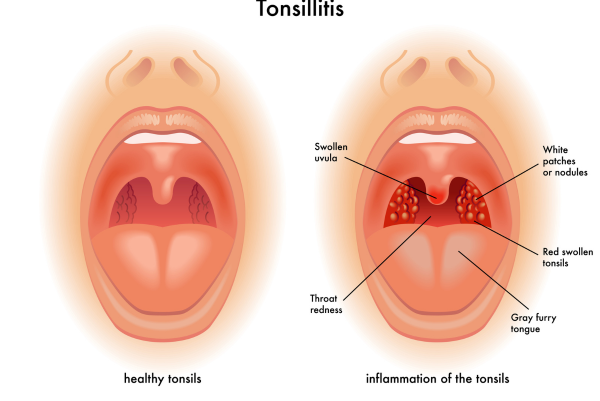Tonsillitis is a common condition that affects millions worldwide. The tonsils are located at the back of the throat and are part of the body’s lymphatic system. The tonsils play a crucial role in the body’s defense against infections. However, when they become infected by either a virus or bacteria, the inflammation develops into tonsillitis, which can be caused by either viruses or bacteria. Because the condition is extremely common and impacts individuals of all ages, it’s essential to learn the warning signs of viral and bacterial tonsillitis and when it’s necessary to seek ENT care from a tonsillitis clinic in West Hills.
Viral Tonsillitis Causes and Pathogens
Viral tonsillitis is primarily caused by common respiratory viruses. The most frequent culprits include:
Adenoviruses: Known for causing respiratory infections and conjunctivitis.
Rhinoviruses: Responsible for the common cold.>
Influenza virus: The virus that causes the flu.
Epstein-Barr virus (EBV): The virus behind infectious mononucleosis, also known as “mono.”
Coxsackievirus: Causes herpangina, characterized by small, painful blisters in the throat.
Warning Signs of Tonsillitis
The symptoms of viral tonsillitis often overlap with those of a common cold or flu. They include:
- Sore throat: Persistent and severe, making swallowing painful.
- Red and swollen tonsils: Often with white or yellow spots.
- Fever: Generally lower grade compared to bacterial infections.
- Cough and nasal congestion: Common with respiratory viruses.
- Fatigue and body aches: Indicative of a systemic viral infection.
- Swollen lymph nodes: Particularly in the neck area.
- Loss of voice or hoarseness: Due to irritation and swelling.
Tonsillitis Clinic in West Hills Treatment
Diagnosis is usually based on the clinical presentation and patient history. In some cases, a rapid antigen test or a throat culture may be conducted to rule out bacterial infections like streptococcus.
Treatment for viral tonsillitis focuses on symptomatic relief:
Rest and hydration: Essential for recovery.
Pain relievers: Over-the-counter medications like acetaminophen or ibuprofen.
Warm saline gargles: Help soothe the throat.
Humidifiers: To keep the throat moist.
Bacterial Tonsillitis
Bacterial tonsillitis is most commonly caused by Group A Streptococcus (GAS), known as Streptococcus pyogenes. Other bacteria, such as Haemophilus influenzae or Streptococcus pneumoniae, can also be responsible, but GAS remains the primary pathogen of concern due to its potential complications.
Bacterial tonsillitis often presents more severe symptoms than its viral counterpart. Key signs include:
- Severe sore throat is more intense and localized than in viral cases.
- High fever, often above 38.5°C (101.3°F).
- Exudative tonsils with the presence of white or yellow pus-filled spots.
- Swollen and tender lymph nodes, particularly in the neck.
- Bad breath is often a result of bacterial overgrowth.
- Unlike viral infections, a cough is typically absent.
- Difficulty swallowing and speaking due to significant swelling and pain.
Bacterial Tonsillitis Diagnosis and Treatment
A rapid strep test or throat culture is essential to confirm a bacterial infection and differentiate it from viral causes. Treatment for bacterial tonsillitis generally involves antibiotics:<
Antibiotics: Penicillin or amoxicillin are commonly prescribed. Alternatives like azithromycin or cephalosporins may be used for those allergic to penicillin.
Symptomatic treatment: Similar to viral tonsillitis, including pain relief and supportive care.
Rest and hydration: Crucial for recovery.
The Importance of ENT Treatment at a Tonsillitis Clinic in West Hills
ENT specialists have significant expertise in managing tonsillitis for several reasons. Differentiating between viral and bacterial tonsillitis can be challenging but is crucial for appropriate treatment. ENT specialists use their skills and tools to make an accurate diagnosis. They can provide advanced treatment options and manage complications, such as abscesses or chronic tonsillitis. For cases where tonsillitis is recurrent or complications arise, ENT specialists can perform procedures like tonsillectomy (surgical removal of the tonsils). ENT doctors at a tonsillitis clinic in West Hills can also address commonly related issues, such as sinusitis or ear infections, which are common in patients with chronic tonsillitis.
Certain situations warrant immediate consultation with an ENT doctor in West Hills:
Recurrent Tonsillitis: Defined as multiple episodes in a year. ENT evaluation is essential for potential surgical intervention.
Chronic Tonsillitis: Persistent infection lasting longer than a few weeks, leading to ongoing symptoms.
Peritonsillar Abscess: A severe complication where pus forms around the tonsil, causing significant pain, difficulty swallowing, and even airway obstruction.
Severe Symptoms: If symptoms are particularly intense or don’t improve with standard treatment.
Breathing or Swallowing Difficulties: Indicating potential complications needing immediate attention.
Tonsillitis in Immunocompromised Patients: Such patients require specialized care to prevent severe outcomes.
Complications and Long-term Consequences of 
Both viral and bacterial tonsillitis can lead to complications if not properly managed:
- Peritonsillar Abscess is more common with bacterial tonsillitis, requiring drainage and antibiotic treatment.
- Rheumatic Fever is a rare but serious complication of untreated streptococcal infections, leading to heart, joint, and neurological issues.
- Post-streptococcal glomerulonephritis is a type of kidney inflammation following a streptococcal infection.
- Chronic Tonsillitis is a persistent infection that can cause ongoing symptoms and impact quality of life.
There are measures you can take to prevent tonsillitis. They include:
Good Hygiene: Regular hand washing and avoiding close contact with infected individuals.
Healthy Lifestyle: Maintaining a balanced diet and adequate rest to support the immune system.
Vaccinations: Staying up-to-date with vaccines, especially for influenza, can reduce the risk of viral infections leading to tonsillitis.
Avoiding Irritants: Such as tobacco smoke and pollutants, which can exacerbate throat conditions.
Conclusion
Viral and bacterial tonsillitis, though common, requires distinct approaches to diagnosis and treatment. Recognizing the warning signs and seeking timely treatment at a tonsillitis clinic in West Hills can prevent complications to ensure an optimal recovery. If you’re experiencing the symptoms of tonsillitis, contact C/V ENT Surgical Group today for an appointment for diagnosis and treatment.


